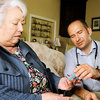High-Intensity Care Management Program Shows Promise for Reducing Hospital Use and Spending for Super Utilizers

Research
Nov 19, 2018
With persistent concerns about health care expenditures, the health care field has recognized a group of patients known as super utilizers—people with complex health needs and socioeconomic challenges who have very high levels of hospital use.

